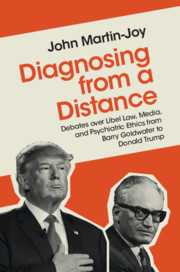 Diagnosing from a Distance
Diagnosing from a Distance Book contents
- Diagnosing from a Distance
- Diagnosing from a Distance
- Copyright page
- Dedication
- Contents
- About the Author
- Acknowledgments
- Abbreviations
- Introduction An Ethical Dilemma
- Chapter 1 Psychoanalysis, Media, and Politics from the Rise of Hitler to the 1950s
- Part I Diagnosis from a Distance and Libel Law in the 1960s: Goldwater v. Ginzburg
- Chapter 2 Ralph Ginzburg
- Chapter 3 “To Remove This Precedent”
- Chapter 4 Ginzburg, Goldwater, and the Supreme Court
- Part II Professionalization and the Rise of the Goldwater Rule
- Appendix The Goldwater Rule in 1973 and Today
- Photographs of Key People and Events
- Notes
- Works Cited
- Index
Chapter 4 - Ginzburg, Goldwater, and the Supreme Court
from Part I - Diagnosis from a Distance and Libel Law in the 1960s: Goldwater v. Ginzburg
Published online by Cambridge University Press: 29 February 2020
- Diagnosing from a Distance
- Diagnosing from a Distance
- Copyright page
- Dedication
- Contents
- About the Author
- Acknowledgments
- Abbreviations
- Introduction An Ethical Dilemma
- Chapter 1 Psychoanalysis, Media, and Politics from the Rise of Hitler to the 1950s
- Part I Diagnosis from a Distance and Libel Law in the 1960s: Goldwater v. Ginzburg
- Chapter 2 Ralph Ginzburg
- Chapter 3 “To Remove This Precedent”
- Chapter 4 Ginzburg, Goldwater, and the Supreme Court
- Part II Professionalization and the Rise of the Goldwater Rule
- Appendix The Goldwater Rule in 1973 and Today
- Photographs of Key People and Events
- Notes
- Works Cited
- Index
Summary
The losing side in Goldwater v. Ginzburg appealed, then asked the Supreme Court to review the appeals court verdict. The decision to file writ of certiorari (a formal request for the Court to review the case) was not an empty exercise. In the wake of New York Times v. Sullivan (1964), no one knew exactly how the new doctrine of libel – “actual malice” – would be applied or what its limits might be. This chapter looks at how the Supreme Court viewed Ralph Ginzburg and Fact magazine and shows how at least some of the justices reasoned about hearing the case. I trace Ginburg’s hope that he could loosen libel law at the highest level and Goldwater’s hope that he could protect future public figures from libel even under the dramatically loosened standard represented by Sullivan. The Court’s decision was the occasion for some of Justice Hugo Black’s most eloquent words. As I show, throughout the process the media and Goldwater’s supporters took a keen interest in the outcome, just as Goldwater had hoped.
Keywords
- Type
- Chapter
- Information
- Diagnosing from a DistanceDebates over Libel Law, Media, and Psychiatric Ethics from Barry Goldwater to Donald Trump, pp. 122 - 134Publisher: Cambridge University PressPrint publication year: 2020
